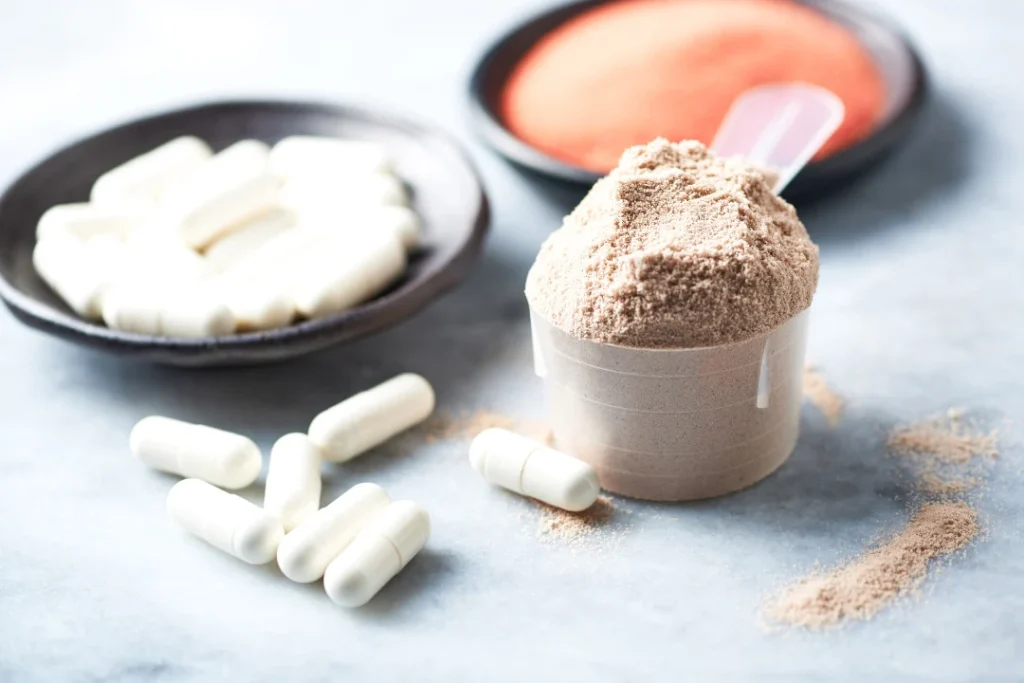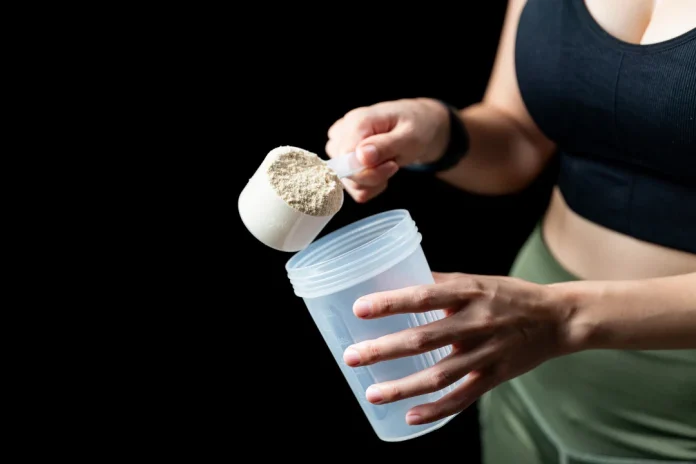Creatine Pros And Cons:
Creatine is an amino acid offering many benefits to both sedentary and athletic types, but proper dosing and moderation are important to achieve its best effects without feeling any of its drawbacks. In this article, we take a close look at the pros and cons of creatine.
A darling of the fitness world for decades, creatine is known for its capacity to increase muscle mass, strength, and power. It’s classified as an ergogenic aid, but it’s also known for its nootropic properties. Therefore, athletes in the field and executives in the boardroom may benefit from creatine supplementation. With proper dosing, you can enjoy all the benefits of creatine without significant side effects, and this supplement ingredient is generally recognized as safe and effective.
Creatine is an amino acid produced naturally in the liver, pancreas, and kidneys. It’s also consumed in animal products like seafood and red meat. While your body naturally produces about 1-2 grams per day, a typical omnivorous diet gives you another 1-2 grams per day. Since you’re excreting creatine through urine faster than you can use it, it may be beneficial to increase your creatine stores through supplementation, and the standard maintenance dose for creatine supplementation is about 3-5 grams per day.
You May Also Like:
10 Science-Backed Reasons to Eat More Protein
A High-Protein Diet Plan to Lose Weight and Improve Health
Since it can’t be found in plant sources, vegetarians and vegans may benefit the most from creatine supplementation; however, this popular ingredient can boost athletic and cognitive performance in omnivores too. We’ll discuss some creatine pros and cons, and we’ll recommend one of the best sources of creatine on the market.
Creatine Pros And Cons is an original (HighProteinLife) article.
Creatine pros and cons:
Increased muscle mass
Creatine is best known for its capacity to increase muscle mass. It’s stored primarily in the skeletal muscle, where it boosts levels of adenosine triphosphate (ATP), the body’s energy-carrying molecule. Creatine is converted to phosphocreatine in the body, which, when reverted to creatine, phosphorylates a molecule of adenosine diphosphate (ADP) to ATP. This is how phosphocreatine produces an energy reserve by rapidly synthesizing ATP.
Since ATP is rapidly broken down during strenuous workouts, extra energy reserves from creatine supplementation can allow you to perform muscle contractions with greater strength and endurance, ultimately leading to muscle gains. Creatine can also reduce muscle tissue breakdown and enhance muscle recovery, allowing you to take shorter rest periods between workouts. Additionally, this supplement may be particularly helpful for the prevention of muscle degeneration that occurs with age.

Creatine pros and cons:
Enhanced cognitive function
Creatine supplementation may increase creatine levels in the brain by up to 10%. The brain demands high levels of energy, and while it makes up only about 2% of our body weight, it consumes up to 20% of the energy we get from calories. In much the same way that it supplies extra energy to muscles, creatine supplies much-needed energy to the brain, boosting brain function. This amino acid can increase the energy supply to neurons, and the ATP it helps produce is directly involved in the production of critical neurotransmitters. Creatine has earned its status as a nootropic as it has been shown to improve memory and intelligence scores.
Creatine pros and cons:
Reduced fatigue
Creatine may be most beneficial when the brain is under duress, such as during periods of stress or sleep deprivation, and supplementation has been shown to improve reaction time, balance, and mood in sleep-deprived subjects. During periods of duress, when brain ATP turnover is altered, creatine can help restore balance, providing the brain with the extra energy it needs. Additionally, for the average person who does not perform regular, strenuous workouts, creatine supplementation can boost energy for everyday tasks. As a powerful antioxidant, it may also promote brain recovery and slow down the aging process.
Creatine Pros And Cons is the (HighProteinLife) report.
Creatine pros and cons:
Weight gain
Many fitness enthusiasts begin creatine supplementation with a ‘loading’ phase. This means they attempt to saturate their muscle cells with creatine by taking up to 20-25 grams per day for the first 5-7 days, then switching to a maintenance dose. This level of saturation is necessary to experience the full benefits of creatine; however, saturation can also be achieved by taking a maintenance dose of about 3-5 grams per day for about 28 days.
The most common side effect of creatine use is bloating accompanied by weight gain. Individuals taking creatine for 28 days with a loading phase may gain an average of 2.9 pounds; however, this weight gain represents water retention and muscle gain, not fat. Taking creatine pulls water into muscle cells, and bloating may, in fact, be a sign that muscle glycogen stores are saturated and ready to provide you with the energy you need for your next workout.

Creatine pros and cons:
Potential side effects
Most creatine side effects occur at doses of 10 grams or higher per serving. Users taking high doses may experience diarrhea, stomach upset, and belching. (This is why athletes prefer to split their ‘loading phase’ dose into about five servings per day.) Once muscle stores are saturated, it’s not recommended to take more than a simple maintenance dose of creatine, as excess does not confer any additional benefits and is simply excreted through urine.
There have been concerns about the potential for high doses to cause kidney damage or to cause the body to stop making its own creatine; however, moderate doses of creatine are generally regarded as safe. There are no withdrawal effects when you stop taking creatine; the body simply returns its creatine stores to previous levels.
Choosing a supplement containing creatine
If you are hoping to enjoy the benefits of creatine, it’s important to choose a clean product that meets your needs. GAMMA by BrainLuxury is a standout product designed to nourish your brain, improve focus, and deliver the extra energy needed to stick to a hectic schedule. Each serving of GAMMA contains 750 mg creatine, plus other brain-boosting ingredients like ingredients like omega-3 and omega-9 fatty acids, MCT oil, antioxidants like alpha-lipoic acid and trans-resveratrol, vitamins, and minerals.
Each drinkable dose is made with fresh orange juice and is gluten-free and vegan with no added sugar or artificial flavors. GAMMA harnesses the energizing properties of creatine, combining it with ingredients that act synergistically to deliver optimum focus and creativity.

Creatine pros and cons:
Putting it all together
Creatine is a safe and effective ingredient that has been proven to deliver results as both an ergogenic aid and a nootropic. Whether an avid gym rat or an overworked executive, you can enjoy the benefits of creatine if properly dosed. As side effects occur only if it’s ingested in very high doses, creatine is a safe and effective way to enhance your performance at the gym or in the boardroom.
Further Reading:
Forbes: Your Guide To The Best Creatine Monohydrate Supplements In 2023
The Guardian: Extreme gains: how the sports supplement industry bulked up
The Guardian: Want to be Mr Muscle?
Important Note: The information contained in this article (Creatine Pros And Cons) is for general informational purposes only, and should not be construed as health or medical advice, nor is it intended to diagnose, prevent, treat, or cure any disease or health condition. Before embarking on any diet, fitness regimen, or program of nutritional supplementation, it is advisable to consult your healthcare professional in order to determine its safety and probable efficacy in terms of your individual state of health.
Regarding Nutritional Supplements Or Other Non-Prescription Health Products: If any nutritional supplements or other non-prescription health products are mentioned in the foregoing article, any claims or statements made about them have not been evaluated by the U.S. Food and Drug Administration, and such nutritional supplements or other health products are not intended to diagnose, treat, cure, or prevent any disease.
